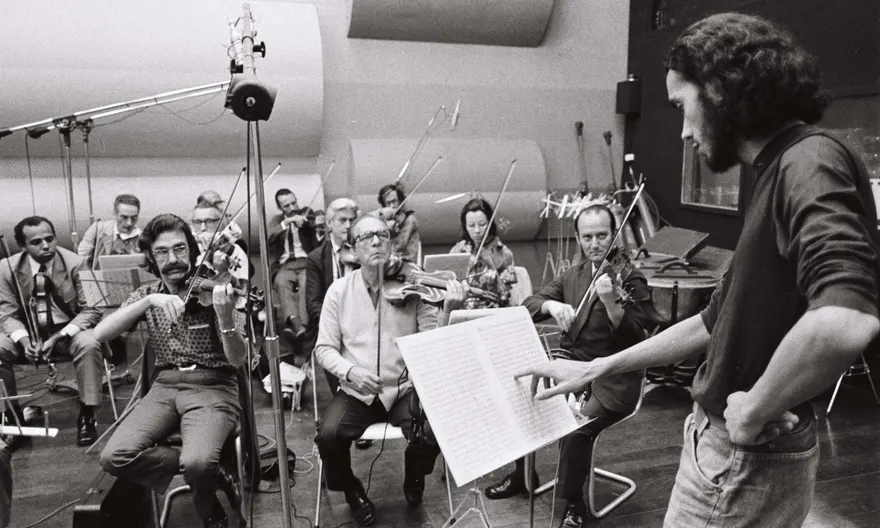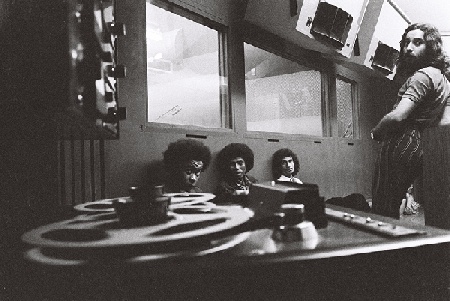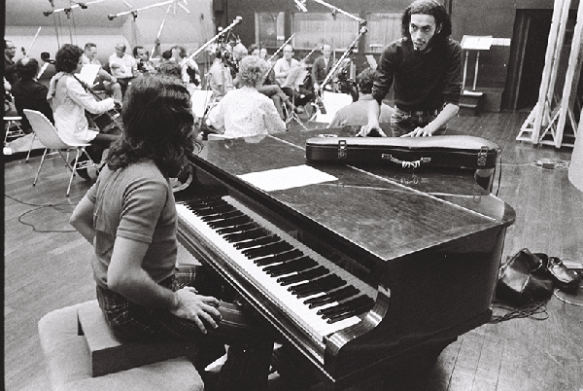Timeless Affairs: Arthur Verocai
- kayteevlk
- Oct 11, 2022
- 6 min read
Welcome to Timeless Affairs, the corner within Steppin' Into Tomorrow, where we shine a spotlight on essential albums that have shaped our culture (and lives in many cases). We lovingly revisit, explore and zoom in on these gems in their full length. Digging out stories and fun facts from the making of the masterpieces that have built the foundation of the music today and continue to shape the future.

Brazilian composer Arthur Verocai’s self-titled debut masterpiece celebrates 50 years of existence this year and let's be real: there's never enough celebration when it comes to this timeless affair. Verocai's gleaming compositions were way ahead of their time, challenging the status quo musically and lyrically. It took just about three decades for the world to catch up to what's now considered one of Brazil's most beloved releases of all time. Definitely one not to be slept on.
“I could listen to the album everyday for the rest of my life” -Madlib
Growing up, Rio de Janeiro native Arthur Verocai was surrounded by a plethora of sounds, ranging from bossanova, samba, jazz, heavy soul & funk, black American and post-Beatles music, inspired by artists like Frank Zappa, Wes Montgomery, Miles Davis, Stan Kenton, Jobim, and Tim Maia to name a few. Starting with music by taking guitar lessons from Roberto Menescal in the early 60s, young Arthur got really into songwriting. He scored children's plays and recorded songs with arrangements by Eumir Deodato, became part of Musicanossa songwriters society together with Marcos Valle, Roberto Menescal, and Milton Nascimento, later becoming a self-taught arranger, all of this before his mid-20's.
After this rich experience in arranging, producing, and composing pieces for other prestigious artists such as Elis Regina, Celia, Erasmo Carlos, Jorge Ben or Ivan Lins, among many others, and work for television, Verocai accepted an invitation to record his own album, under the condition of guaranteed unlimited freedom and a very generous budget.
Immersing himself into the production process, he incorporated a lush 20-strong string section consisting of twelve violins, four violas, four cellos, brass, percussion, keyboards, and the first synthesizer in Brazil (borrowed from Luiz Paulo Simas from rock group Vímana) used mainly in ‘Caboclo’ also adding a phaser in the strings to create a mood in songs like ‘Na Boca do Sol’ & ‘Dedicada a Ela’.
This progressive and experimental project results in a rich, monumental, dreamlike mosaic of sound, a heavy funk-jazz infused journey with a soulful feel that seems to erase the borders of space and time for a moment and take you to a place of wonder. Embodying everything the current authoritarian military dictatorship government in Brazil stood against at the time - deeply moving music intertwined with subtle political metaphors (almost all lyrics composed by São Paulo poet Vitor Martins).
“It was made during tough times in Brazil, when many lyrics were censored by the dictatorship,” says Verocai. “So, to avoid problems, Vitor had to use a lot of metaphors in the lyrics. 'Presente de Grego' meant that the dictatorship was a Trojan horse to Brazil, a bad gift. And 'Pelas Sombras' was about the way the government secret police acted in the shadows, hidden from public, getting people arrested. It was like camouflaging our feelings. But for me, I just wanted to make the best music I could.”
The magical cover has been photographed by Arthur's dear friend, Fernando Bergamaschi. He suggested going to this small dead-end street with a hole in the wall at the end. They went through the hole and saw a huge old abandoned house from the 19th century, leaves on the ground... The place doesn't exist anymore, but Fernando also took millions of pictures in the studio and captured the creation process ever so wonderfully on film.
Fernando Bergamaschi Photography
Some of the recruited musicians for this one-of-a-kind project were some of the best musicians of the 70s, not yet as famous at the time as many of them are now. Crème de la crème players like Paulo Moura on sax, tenor sax player Nivaldo Ornellas (from Milton Nascimento's band), Paulinho Trompete, Oberdan Magalhães on flute & sax, Toninho Horta and his sister Gilda Horta on vocals, Hélio Delmiro on guitar, ace drummers Pascoal Meirelles & Robertinho Silva, milestone in Brazilian percussion Pedro Sorongo Santos, Luiz Alves on bass, trombonists Serginho Trombone and Edson Maciel (on 'Karina' there's a two-minute long trombone solo by him), Aloísio Milanes on the keys, and the singer Célia, whose album Verocai produced that year (you can hear her voice on 'Seriado').
Things just magically happened on this record. For example, besides playing trumpet on what apparently has been his first recording session ever, Paulinho Trompete also sang on 'Na Boca do Sol'. Arthur only ever recorded his own voice once - on the very first track of the album 'Caboclo'. The track 'Pelas Sombras’ also features the legendary Brazilian soul singer Carlos Dafé and Luiz Carlos on vocals, the drummer from the Dom Salvador Abolição band (oh, and we're screening the documentary on Dom Salvador in a few weeks in Amsterdam, you are most welcome to join us).
The half an hour of sonic adventures split into 10 magnificent tracks, released on the extinct label Continental, wasn't exactly welcomed with open arms by the public at the time. Disappointed in the critical reception of the album, Arthur Verocai moved on to producing jingles for advertising campaigns, where he had greater success and financial return after this solo release flopped initially. However, in the early 90s, the record infiltrated a wider consciousness of the public, gaining cult-like following in Europe and in the States, rediscovered by musicians and DJs, getting sampled by multiple hip hop giants such as MF DOOM, Ludacris, 9th Wonder and more (see below a playlist with a few examples).
Currently the original pressing of this record on vinyl is on the wishlist of countless record collectors around the world, extremely rare and if you manage to find one, be ready to cash out a few thousand dollars on Discogs (apparently in 2014, a copy of the vinyl was sold for 5,100 US$ on eBay).
Luckily, this year's official 50th-anniversary reissue is WAY more affordable, and if you don't have your own copy yet, here's a chance to secure one. Gold & Black marbled vinyl, mastered at 'half-speed' at Abbey Road, taken from the original Continental master tapes, transferred under supervision by Arthur Verocai, and it comes with a beautiful 16-page booklet with beautiful photographs from the original recording session and an interview with the man himself.
In 2009, a full orchestra was arranged for Verocai to perform the album compositions live in its entirety at the Luckman Fine Arts Complex in Los Angeles, as a part of concert series organized by Brian Cross (aka B+), filmed for a DVD release. The series also presented a performance by Ethiopia’s own Mulatu Astatke and 'Suite For Ma Dukes', a tribute to the late great James "Dilla" Yancey, by Miguel Atwood-Ferguson).
With guests such as drummer Ivan “Mamao” Conti, the late keyboardist José Bertrami (both from the samba jazz fusion group Azymuth), the percussionist Airto Moreira, and supporting DJ set by Madlib, this occasion also marked the very first time Verocai got to perform the recording live since it was released. Paradiso Amsterdam was amongst the few places worldwide that were blessed by this performance shortly after and this year, at the occasion of 50th anniversary, he will perform the album live in São Paolo. This recording was recently pressed on vinyl in superb quality again at the occasion of 2021 Record Store Day and you can most likely still find it in your favorite record store under 'Mochilla Presents: Timeless by Arthur Verocai'.
"A true master conductor. Just as incredible live as recorded" - MF DOOM

Inspired by the revival of his work in the 90s, Verocai was prompted to make more music - independent release 'Saudade Demais' in 2002, 'Encore' in 2007 on London-based label Far Out Recordings, and nine years later the album 'No Voo Do Urubu' featuring guests such as Seu Jorge and Mano Brown, on Japanese label Kissing Fish, later reissued by Light in the Attic.
Arthur Verocai's latest musical adventures seem to really connect the dots between his legacy and all of the artists he has influenced over the years. Like his latest collaboration with the Australian band Hiatus Kaiyote on their 2021 album 'Mood Valiant', a few songs arrangements for the Canadian group BadBadNotGood and the stunning arrangement for Tyler the Creator's score for Virgil Abloh's posthumous show at Paris fashion week. But that's only to name a few.
Arthur Verocai keeps on moving forward, more relevant and vibrant than ever, continuously keeping us on our toes and touching our souls with his musical endeavors.
Eternal gratitude.
More flowers for Arthur Verocai.
Love.
💐💐💐
Steppin' Into Tomorrow stands with artists & labels and encourages listeners to support by buying their music directly from Bandcamp. If you've enjoyed this article, please consider subscribing to our monthly newsletter to stay in the loop.










